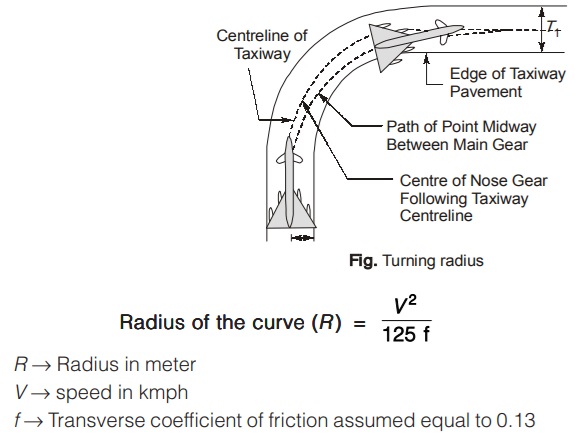Geometric Design of Taxiway
Speed of an aircraft on runway is relatively faster than the speed on taxiway. Thus design standards, for a taxiway is not as rigid as they are for runway.
The geometric design standards of taxiway are:
(i) Length of taxiway: It should be short as it will save fuel consumption. There is no specific recommendation for length.
(ii) Width of taxiway: Width of taxiway is lesser than that of runway because speed at taxiway is lower and aircraft is not airborne. Normally it varies between 7.5 m to 22.5 m.
(iii) Width of Safety Area: It includes partially paved shoulders on either side plus the area that is graded and drained.
(iv) Longitudinal Gradient
- Steeper gradient demands greater fuel consumption, so level taxiways are more desirable.
- ICAO recommends that maximum longitudinal gradient should be 1.5% for A and B types and 3% for other types of airports.
(v) Transverse gradient: It is provided for quick drainage. Maximum transverse gradient is taken 1.5% for A, B and C types and 2% for other types of airports.

(vi) Rate of change of longitudinal gradient: ICAO recommends that maximum rate of change of slope in longitudinal direction 1% per 30 m length of vertical curve for A, B and C types and 1.2% in 30 m length for D and E types of airports.
(vii) Sight distance: Since speed on taxiway is slower than runway so smaller sight distance is required comparatively. ICAO recommends that
(a) For A, B, C type of airport, surface of taxiway should be visible from 3 m height for 300 m distance.
(b) For D, E type of airport, surface of taxiway should visible from 2.1 m height for 250 m distance.
(viii) Turning radius
- It is provided to change the direction of aircraft path a horizontal curve is required.
- The curve is so designed that aircraft can negotiate it without reducing speed significantly.
- Circular curve of large radius is preferred.

Note:
- For large subsonic jet Rmin = 120 m. (for any value of speed)
- For supersonic transport, Rmin = 180 m (for any value of speed)
- According to Horonjeff, the radius of taxiway should be decided such that the distant of the oleo strut of the nearby main gear is not less than 6 m from the pavement edge.
- According to Horonjeff, we have



